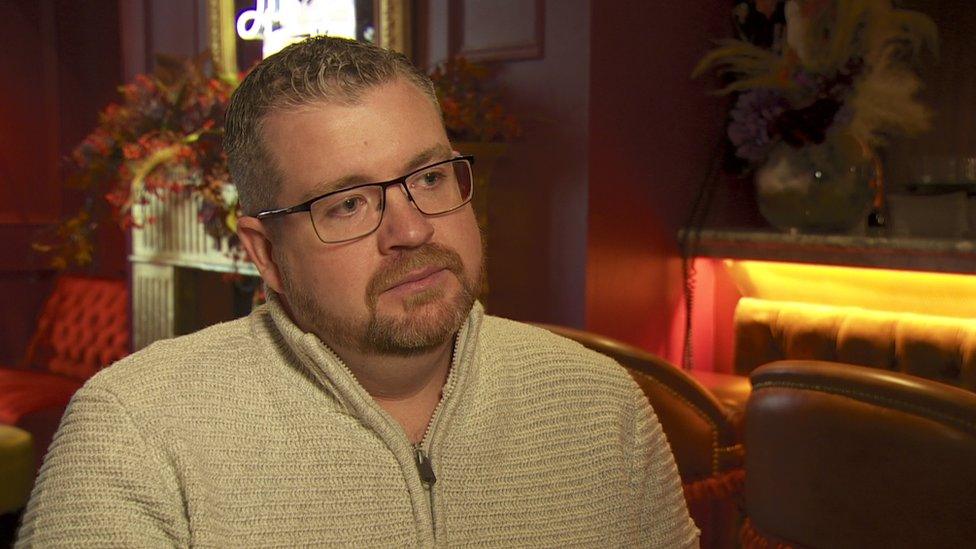Infected blood scandal: NI victims to receive £100,000
- Published
Infected blood scandal: 'I've been a carer rather than a daughter'
About 100 victims of the infected blood scandal in Northern Ireland are each set to receive an interim compensation payment of £100,000.
Thousands of people in the UK contracted HIV or hepatitis C in the 1970s and 1980s as a result of NHS treatments.
Health Minister Robin Swann said he hoped payments would start in October.
Welcoming the announcement, he said the department was working "to ensure that the payments will be made at pace".
"We would hope to see those payments actually start in October as well - but we are reliant on the transfer of money coming from Treasury," said Mr Swann.
He added that the department had been working in the background to ensure the money comes directly to them and not through the Department of Finance or to the Assembly or Executive.
"So that this money comes into our systems so we can get it out to those who will benefit from it," he said.
Conan McIlwrath, from Larne in County Antrim, was born with haemophilia but contracted hepatitis from contaminated blood given to him as a child.
He told BBC News NI that it was a "historic move, particularly as it is the first time it has been called compensation".
Mr McIlwrath, who contracted hepatitis C stage one, is the vice-chair of the UK Haemophilia Society.
"This is an interim payment and we would also like an assurance that the entire Robert Francis Report, external will be implemented," he said.
'Tragedy'
Mr Swann said health officials in Northern Ireland were working on the payments with their counterparts in Westminster.
"The use of contaminated blood and blood products in the 1970s and 1980s was a tragedy for everyone involved," he said.

Conan McIlwrath described the compensation announcement as historic
"I am very aware of the financial hardships and suffering endured since then."
The UK government intends to make payments to those who have been infected and bereaved partners of victims in England by the end of October.
The interim compensation payment complies with the recommendations set out by Sir Brian Langstaff, the chair of the public inquiry into the scandal.


It is difficult to watch older men cry but during the Infected Blood Inquiry I saw it happen several times.
Amid the moving testimonies from victims, tears of despair were also shed.
That was just in Belfast - this inquiry team has travelled across the UK.
Thousands of men and women have cried as their families looked on feeling helpless.
No-one really wins in a public inquiry. In this one they had to fight for decades to get justice.
As well as the revelation of mistakes within the health service there were also accusations that some of the authorities, including in the NHS and Whitehall, had been engaged in a "complicity of silence".
While those looking on might think the compensation is a win, those receiving it are more likely to see it as too little, too late.
Many are too sick to enjoy it and too many others are no longer around to benefit from it.

According to the UK government, all of those who are registered with any of the four nations' infected blood support schemes will receive the payment.
It said: "Advice to those people on how exactly the interim payment will be made will be outlined to them shortly.
"The intention is that payments will be tax-free and will not affect any financial benefits support an individual is receiving."
Prime Minister Boris Johnson said nothing could "make up for the pain and suffering endured by those affected".
"We are taking action to do right by victims and those who have tragically lost their partners by making sure they receive these interim payments as quickly as possible.
"We will continue to stand by all those impacted by this horrific tragedy, and I want to personally pay tribute to all those who have so determinedly fought for justice."